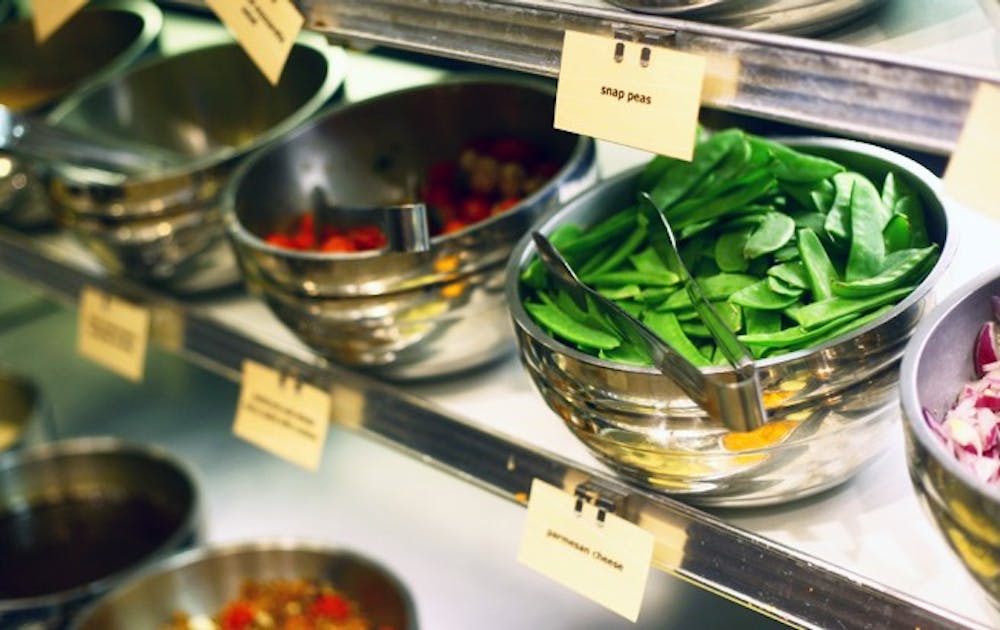The University has stopped purchasing locally sourced food for the remainder of the semester.
Duke Dining decided last week to stop buying produce and meat from local vendors for the remainder of the academic year to assess purchasing needs and to negotiate prices, said Rick Johnson, assistant vice president of student affairs for housing, dining and residence life. The change will affect food served in venues managed by Bon Appetit, the University’s food service provider, which includes the Great Hall and the Marketplace. The decision was made in an effort to improve future relationships with vendors and to prepare Duke Dining for the Fall as facilities make the transition from the West Union Building to the new Events Pavilion, which will open August 2013.
“We ran into some situations that we weren’t aware of [related to] pricing agreements with the vendors,” Johnson said. “We just want to hear from each local vendor how they’ve been working with us and how we’re going to work with them in the future.”
In the interim period, Duke Dining’s food will be sourced from non-local vendors that do not currently contract with Duke. The University will also use supplies already on hand from local vendors and the Duke Campus Farm.
Johnson added that the hiatus on local sourcing does not reflect a change in Duke’s commitment to sustainability, which local vendors play a role in promoting by reducing energy use in transportation and producing more organic products.
Currently, Duke Dining and Bon Appetit, the University’s food service provider, have contracts with a handful of local vendors, including Eastern Carolina Organics, Farmhand Foods and Harris Robinette Farm. All local vendors will be affected by the hiatus.
Michelle Nowlin, senior lecturing fellow and supervising attorney for Duke’s Environmental Law and Policy Clinic, said it is normal for a business to re-evaluate its strategic vision and how to best meet consumer demands from time to time. She added, however, that the suddenness of the decision could be troublesome for farmers.
At this point in the year, many farmers have already planned their planting schedules and purchased and planted seeds. Because the University only notified them of its decision to pause purchasing last week, they could lose profits due to the supply of their products not meeting demand.
“Duke represents a significant chunk of their business,” she said. “An agreement with Duke can determine if they’re going to break even or lose money during the year.”
But Johnson said the hiatus was initiated at the most convenient time possible for all stakeholders. Since only about three weeks are left in the semester, local vendors will only lose the business from that time span. Over the summer, Duke Dining always severely curtails its purchasing, and local vendors are aware of that. Consequently, Duke Dining did not receive much backlash from local vendors after deciding to pause purchasing.
Sandi Kronick, founder and CEO of Eastern Carolina Organics, said the hiatus could lead to a more efficient relationship with the University. Eastern Carolina Organics sells a variety of fruits and vegetables it sources from more than 50 local farmers to Duke Dining.
“I’m confident that more transparency and mutual commitments will lead to stronger relationships,” she wrote in an email Wednesday. “At ECO, we are not at all concerned by this pause if it leads to more clarity and support on campus.”
Although Johnson said the hiatus does not necessarily mean that the University will terminate contracts with any local vendors, Nowlin noted that it did cause concern among farmers. Farmers she has spoken with did not question Duke’s right or obligation to re-evaluate its contracts, she said, but they were slightly troubled by the fact that they were given such short notice.
“Some of them are a little worried [about] what the future is going to look like for them,” she said.
In January, Duke Dining notified the Duke Campus Farm that it would be changing its purchasing agreement with the one-acre fruit and vegetable garden, effective July 2013. Although Duke Dining originally provided 50 percent of the operating budget for the farm, it will cut its support by two-thirds, said farm manager Emily Sloss, Trinity ’10.
“They won’t be investors at the same level they have been in the past, rather we will transition to a more traditional buyer-seller relationship,” she said.
Although the Duke Campus Farm hopes to continue to sell to the two on-campus dining halls run by Duke Dining—the Great Hall and the Marketplace—the farm also hopes to diversify its purchasers in the future, Sloss added. It may look to sell its goods to smaller eateries on campus that support sustainability, like The Refectory, she added.
“Having a sustainable rural economy is critically important to North Carolina,” Nowlin said. “Having locally sourced, sustainable production is better for the environment, public health and rural economic development, and Duke is a big player and is incredibly influential within the market.”
Get The Chronicle straight to your inbox
Signup for our weekly newsletter. Cancel at any time.

